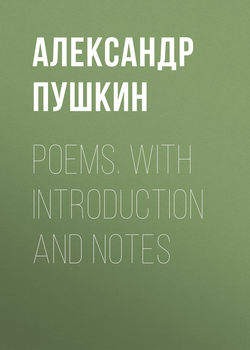Poems. With Introduction and Notes

Реклама. ООО «ЛитРес», ИНН: 7719571260.
Оглавление
Александр Пушкин. Poems. With Introduction and Notes
Preface: Bibliographical
Introduction: Critical
Poems: Autobiographical
Poems: Narrative
Poems of Nature
Poems of Love
Poems: miscellaneous
Notes
Отрывок из книги
1. Pushkin was emphatically a subjective writer. Of intense sensibility, which is the indispensable condition of creative genius, he was first of all a feeler with an Æolian attachment. He did not even have to take the trouble of looking into his heart in order to write. So full of feeling was his heart that at the slightest vibration it poured itself out; and so deep was its feeling that what is poured out is already melted, fused, shaped, and his poems come forth, like Minerva from Jupiter's head, fully armed. There is a perfection about them which is self-attesting in its unstudiedness and artlessness; it is the perfection of the child, touching the hearts of its beholders all the more tenderly because of its unconsciousness, effortlessness; it is the perfection which Jesus had in mind when he uttered that sentence so profound and so little followed because of its very profundity: "Unless ye be like little children." So calm and poiseful is Pushkin's poetry that in spite of all his pathos his soul is a work of architecture,—a piece of frozen music in the highest sense. Even through his bitterest agony,—and pathos is the one chord which is never absent from Pushkin's song, as it is ever present in Chopin's strains, ay, as it ever must be present in any soul that truly lives,—there runneth a peace, a simplicity which makes the reader exclaim on reading him: Why, I could have done the self-same thing myself,—an observation which is made at the sight of Raphael's Madonna, at the oratory of a Phillips, at the reading of "The Vicar of Wakefield," at the acting of a Booth. Such art is of the highest, and is reached only through one road: Spontaneity, complete abandonment of self. The verse I have to think over I had better not write. Man is to become only a pipe through which the Spirit shall flow; and the Spirit shall flow only where the resistance is least. Ope the door, and the god shall enter! Seek not, pray not! To pray is to will, and to will is to obstruct. The virtue which Emerson praises so highly in a pipe—that it is smooth and hollow—is the very virtue which makes him like Nature, an ever open, yet ever sealed book. Bring to him your theories, your preconceived notions, and Emerson, like the great soul of which he is but a voice, becomes unintelligible, confusing, chaotic. The words are there; the eyes see them. The dictionary is at hand, but nought avails; of understanding there is none to be had. But once abandon will, once abandon self, once abandon opinion (a much harder abandonment this than either!), and Emerson is made of glass, just as when I abandon my logic, God becomes transparent enough.... And what is true of Emerson is true of every great soul.
2. The highest art then is artlessness, unconsciousness. The true artist is not the conceiver, the designer, the executor, but the tool, the recorder, the reporter. He writes because write he must, just as he breathes because breathe he must. And here too, Nature, as elsewhere, hath indicated the true method. The most vital processes of life are not the voluntary, the conscious, but the involuntary, the unconscious. The blood circulates, the heart beats, the lungs fill, the nerves vibrate; we digest, we fall asleep, we are stirred with love, with awe, with reverence, without our will; and our highest aspirations, our sweetest memories, our cheerfullest hopes, and alas! also our bitterest self-reproaches, come ever like friends at the feast,—uninvited. You can be happy, blest at will? Believe it not! Happiness, blessedness willed is not to be had in the market at any quotation. It is not to be got. It comes. And it comes when least willed. He is truly rich who has nought left to be deprived of, nought left to ask for, nought left to will....
.....
8. To affirm then the bard is called, and what in "My Monument" is but hinted, becomes clear, emphatic utterance in Pushkin's "Sonnet to the Poet."
But because the bard is called to affirm, to inspire, to serve, he is also called to be worn. To become the beautiful image, the marble must be lopped and cut; the vine to bear sweeter fruit must be trimmed, and the soul must go through a baptism of fire.... Growth, progress is thus ever the casting off of an old self, and Scheiden thut weh. Detachment hurts. A new birth can take place only amid throes of agony. Hence the following lines of Pushkin on the poet:—
.....